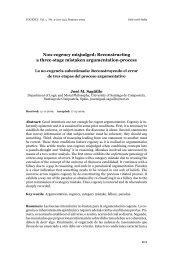Cogency v2 n2
Cogency v2 n2
Cogency v2 n2
You also want an ePaper? Increase the reach of your titles
YUMPU automatically turns print PDFs into web optimized ePapers that Google loves.
Wittgenstein and the Logic of Deep Disagreement / D. M. GODDEN & W. H. BRENNER<br />
Isn’t “defect” a family resemblance term? And aren’t “neurophilosophers”<br />
such as Paul Churchland trying to persuade us to make one member of the<br />
family lord it over the others? But could we “find our feet” with people who<br />
actually used a language that was “reformed” in a way they recommend, i.e.,<br />
with all the indeterminacy eliminated from our “psychological” concepts?–<br />
“Concepts with fixed limits would demand a uniformity of behavior” (RPP-<br />
II § 683). And do we really want that? 30<br />
“Deep Disquietudes”<br />
When we do philosophy we are like savages, primitive<br />
people, who hear the expressions of civilized<br />
men, put a false interpretation on them, and then<br />
draw the queerest conclusions from it. (Ludwig<br />
Wittgenstein, PI § 194)<br />
[As reported by Moore, Wittgenstein] said that what<br />
he was doing was a “new subject” … [and] that<br />
though what he was doing was certainly different<br />
from what, e.g., Plato or Berkeley had done, yet<br />
people might feel that it “takes the place of” what they<br />
had done – might be inclined to say “This is what I<br />
really wanted.” (Ludwig Wittgenstein, PO, p. 113)<br />
The traditional “problems of philosophy” are often thought to generate the<br />
deepest of deep disagreements. Yet Wittgenstein would persuade philosophers<br />
to adopt a fresh conception of the ‘depth’ of these problems. On<br />
Wittgenstein’s view, philosophical problems “have the character of depth.<br />
They are deep disquietudes; their roots are as deep in us as the forms of our<br />
language and their significance is as great as the importance of our language”<br />
(PI § 111).<br />
Wittgenstein suggested that philosophical problems call for a “grammatical<br />
investigation” – one that sheds light on the problems by clearing away<br />
misunderstandings concerning the use of words, misunderstandings<br />
“caused, among other things, by certain analogies between the forms of expression<br />
in different regions of language” (PI § 90). An example of an analogy<br />
that appears to have captivated and mislead more than one philosopher<br />
is the comparison of certain knowledge with a building or tower resting on<br />
30<br />
For more on this, consult RPP-II, LWPP-II, and PI, pp. 223-29.<br />
73








